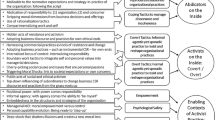Abstract
Actions within organizational contexts should be understood differently as compared with actions performed outside of such contexts. This is the case due to the agentic shift, as discussed by social psychologist Stanley Milgram, and the role that systemic factors play in shaping the available alternatives from which individuals acting within institutions choose. The analysis stemming from Milgram’s experiments suggests not simply that individuals temporarily abdicate their moral agency on occasion, but that there is an erosion of agency within organizations. The point about the erosion of agency is deepened in the discussion of a case study which illustrates the difficulty of identifying even the bare “ownership” of actions within organizations. While this is the case, explicating these reasons suggests that both individual actors and firms can bear ethical responsibility within organizational contexts. As part of the effort to present the whole picture, business ethics courses should introduce students to the relevant insights from social psychology and human factors research.
Similar content being viewed by others
References
T. Beauchamp N. Bowie (2001) Ethical Theory and Business EditionNumber6 Prentice Hall Publishing Upper Saddle River
Belkin, L.: 1997, ‘How Can we Save the Next Victim?’, New York Times Magazine, June 15. Reprinted in Beauchamp and Bowie 2001, pp. 142–152.
R. Boisjoly E. F. Curtis E. Mellican (1989) ArticleTitleRoger Boisjoly and the Challenger Disaster: The Ethical Dimensions Journal of Business Ethics 8 217–230 Occurrence Handle10.1007/BF00383335
F. N. Brady J. M. Logsdon (1988) ArticleTitleZimbardo’s “Stanford Prison Experiment” and the Relevance of Social Psychology for Teaching Business Ethics Journal of Business Ethics 7 703–710
R. Card (2002) ArticleTitle‘Using Case Studies to Develop Critical Thinking Skills in Ethics Courses’ Teaching Ethics 3 IssueID1 19–27
R. Card (2004) Critically Thinking About Medical Ethics Prentice-Hall Publishing Upper Saddle River
L. Kohn J. Corrigan M. Donaldson (Eds) (1999) To Err is Human: Building a Safer Health Care System National Academy Press Washington
S. Kraman G. Hamm (1999) ArticleTitle‘Risk Management: Extreme Honesty May Be The Best Policy’ Annals of Internal Medicine 131 IssueID12 490–496
S. Milgram (1963) ArticleTitleBehavioral Study of Obedience Journal of Abnormal and Social Psychology 67 371–378
S. Milgram (1974) Obedience to Authority Harper and Row New York
Monaghan, P.: 2004. ‘Verbatim’, Chronicle of Higher Education, June 4, p. A11.
D. F. Thompson (2005) Restoring Responsibility: Ethics in Government, Business, and Healthcare Cambridge University Press Cambridge
L. Trevino G. Weaver D. Gibson B. Toffler (1999) ArticleTitleManaging Ethics and Legal Compliance: What Works and What Hurts California Management Review 4 IssueID2 121–127
E. Wolgast (1992) Ethics of an Artificial Person Stanford University Press Stanford
P. Zimbardo (1982) Pathology of Imprisonment D. Krebs (Eds) Readings in Social Psychology, Contemporary Perspectives EditionNumber2 Harper & Row New York 249–251
Author information
Authors and Affiliations
Corresponding author
Rights and permissions
About this article
Cite this article
Card, R.F. Individual Responsibility within Organizational Contexts. J Bus Ethics 62, 397–405 (2005). https://doi.org/10.1007/s10551-005-0302-5
Issue Date:
DOI: https://doi.org/10.1007/s10551-005-0302-5




